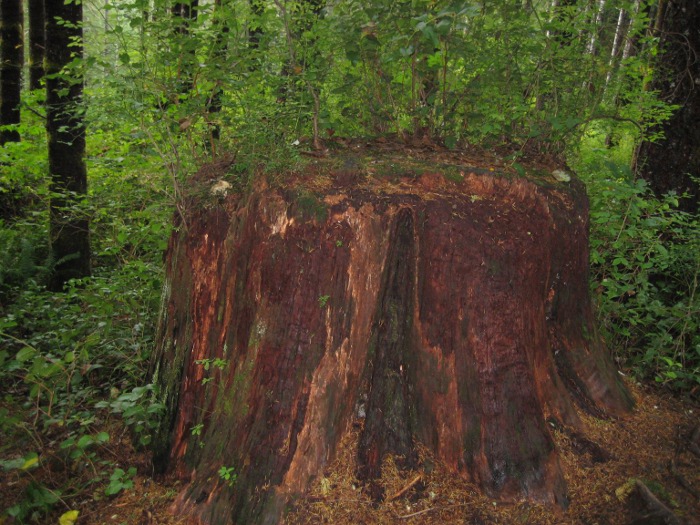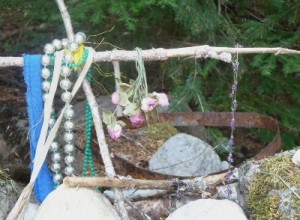
Note: This post was originally posted on No Unsacred Place in 2011, and then later Paths Through the Forests. I am moving it over here so I can have more of my writings in one place.
Ecopsychology: the psychology of how we relate to the natural environment, and the therapeutic application of the restorative qualities of nature.
When I enrolled in a counseling psychology Master’s degree program in 2008, the single biggest magnet for me was the series of three ecopsychology courses that were offered. I had read Bill Plotkin’s Nature and the Human Soul: Cultivating Wholeness and Community in a Fragmented World, which explained human psychological development in part through one’s relationship with nature.
Through three straight semesters, I learned the basics of ecopsychology and who some of the key figures were; I also explored how to incorporate a client’s relationship to nature in their therapy, along with family history, spirituality, and other important parts of the client’s experience. I even spent four days out in the woods with other students learning hands-on wilderness therapy techniques. (I also gave a presentation on how Alan Moore’s run of the Swamp Thing comic book could be used in ecotherapy, but that’s a story for another time.)
Not surprisingly, I discovered much that enhanced my neopaganism. Furthermore, I saw a wealth of material that could be relevant to neopaganism in general, as well as elements of neopaganism and related paths that could enhance the development and practice of ecopsychology. I wasn’t the first person to make the connection of course; on the contrary, some of the very foundational concept of ecopsychology are quite relevant to nature-based paganisms.

Here are just a few of the salient points:
–Ecopsychology helps to explore and understand the development and maintenance of a nature-friendly mindset.
Why do we enjoy being out in the wilderness? What is it that makes us respond better to a tree than a live plasma-screen movie of the same tree?(1) What are the effects of disconnection of nature, both on an individual and systemic basis? Ecopsychologists seek to not only find answers to these questions, but to utilize the information in helping clients achieve better states of mental health. Many pagans are already familiar with the relaxation that can result from a weekend spent camping, or the difference between an indoor and outdoor ritual; ecopsychology provides additional insight as to why we may feel that way.–Ecopsychology sets the individual firmly within the context of the ecosystem they are a part of, human and otherwise.
One of the criticisms that ecopsychologists have of much of modern therapy is that while the average therapy intake form asks clients about their family members, significant others, home life past and present, and other human relationships, it doesn’t ask about the client’s relationship to nature. As psychology, particularly applied in counseling, takes an increasingly systemic view of people and their mental health, research and anecdotal evidence alike deny the (particularly American) ideal of the “rugged individualist”. Rather than an island, each person is part of an interconnected greater system, and the natural world is a part of that. Ecopsychology gently reminds us that our very minds and perceptions are inextricably linked to our environment, something that many neopagans have been living consciously for years.
–Ecopsychology meshes well with nature-based religion.
From its inception in the late 20th century, ecopsychology has always been closely entwined with spirituality, especially (though not exclusively) nature-based spiritual and religious paths. Even the anthology Ecopsychology, which came out in 1995 and is considered one of the foundational texts of the subject, included an essay by Leslie Gray entitled “Shamanic Counseling and Ecopsychology”. Whether theistic or not, spirituality is an intrinsic part of the right-brained tendencies of ecopsychology, and paths ranging from neopaganism to Catholicism(2) have been explored within ecopsychological writings.

–Ecopsychology lends itself well to ritual practices.
Joanna Macy and John Seed’s Council of All Beings rite, and Mary Gomes’ Altars of Extinction(3), are just two of many examples of how ecopsychology has delved into ritual as a way of healing and processing the profound level of grief many feel at the destruction of the environment. Ecopsychologists recognize ritual as a structured way for clients to process and work through life experiences past and present; additionally, as many neopagan rituals tend to be focused on the bright, celebratory side, an exploration of the processing of grief may be valuable to our spiritual communities.
As you can see, just in these few examples there are plenty of areas of overlap between ecopsychology and neopagan interests and practices. Our relationship to the world, to include that expressed in spirituality, depends heavily on our perceptions and cognitions; we cannot experience and interpret what is around us without the filters of our senses and our thoughts. Ecopsychology is a formal, though often quite organic, exploration of that relationship between personal microcosm and universal macrocosm.
1. There’s a great study done a few years ago that demonstrated just that; you can read the paper that resulted at http://faculty.washington.edu/pkahn/articles/520_kahn.pdf
2. During my first ecopsych course, one of the co-authors of the excellent text, Care for Creation: A Franciscan Spirituality of the Earth, spoke at one of the classes. Those readers with a particular interest in interfaith dialogue may be interested in the book, though it’s an enlightening read in general.
3. The Altars of Extinction project was featured in issue #96 of Reclaiming Quarterly: http://www.reclaimingquarterly.org/96/96-altarextinct.html
Did you enjoy this post? Please consider supporting my work on Patreon, buying my art and books on Etsy, or tipping me at Ko-fi!
